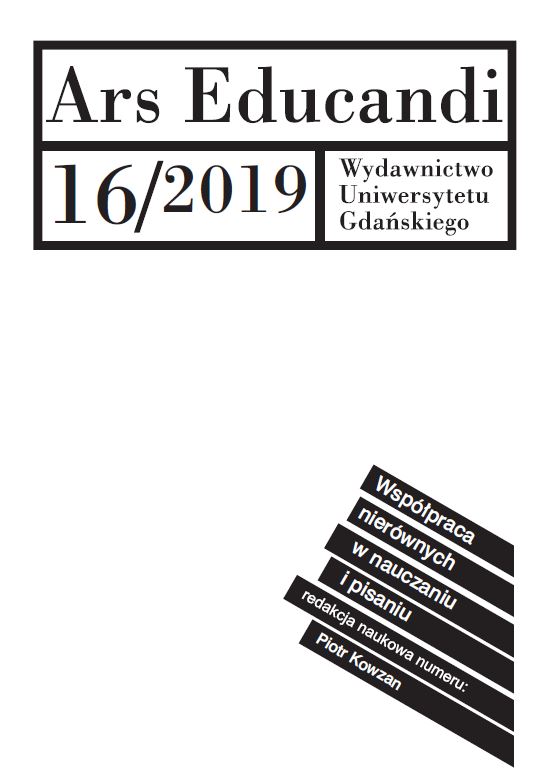Care, contingency and capability: ecological perspectives on higher education
DOI:
https://doi.org/10.26881/ae.2019.16.10Słowa kluczowe:
ethical relations, scholarly collaboration, workload allocation modelsAbstrakt
This article takes a sideways look at conventional academic practices, with a view to re-instating ethical relations as the core of scholarly inquiry and revitalising interdisciplinary collaboration between academics at different stages of their careers. It focuses specifically on the deleterious effects of workload allocation models, with particular attention to how these distort relationships between colleagues.
Downloads
Bibliografia
Arendt, H. (1998 [1958]) The Human Condition. Chicago: University of Chicago Press.
Ball, S. (2000) Performativities and fabrications in the education economy: towards the performative society? Australian Educational Researcher, 27 (2) 1-23.
Ball, S. (2001) Performativities and fabrications in the education economy: towards the performative society, in D. Gleeson and C. Husbands (eds) The Performing School. Managing Teaching and Learning in a Performance Culture, London: Routledge Farmer.
Ball, S. (2003) The teacher’s soul and the terrors of performativity, Journal of Education Policy, 18 215-228.
Ball, S. (2008) Performativity, privatisation, professionals and the State, in B. Cunningham (ed) Exploring Professionalism, London: Institute of Education.
Ball, S. (2012) Performativity, commodification and commitment: an I-Spy guide to the neoliberal university, British Journal of Educational Studies, 60 (1) 17-28.
Ball, S. (2015) Living in the neo-liberal university, European Journal of Education, 50 (3) 258-261.
Collini, S. (2012) What are Universities for? London: Penguin Books.
Day, S. and Pirrie, A. (2019) Tales from the Matrix: student satisfaction as a form of governmentality. Paper presented at the European Conference for Educational Research, Hamburg, 3 September 2019.
Dylan, B. (1963) ‘The Times They are A’Changin’. (Witmark Demo, 1963) Lyrics © Sony/ATV Music Publishing LLC, Audiam, Inc.
Englund, H. and Gerdin, J. (2019) Performative technologies and teacher subjectivities: a conceptual framework, British Educational Research Journal, 45 (3) 502-517.
Foucault, M. (1993) About the beginning of the hermeneutics of the self: two lectures at Dartmouth, Political Theory, 21 (2) 198-227.
Haraway, D. (2016) Staying with the Trouble. Making Kin in the Chthulecene, Durham, NC: Duke University Press.
Jabès, E. (1996) The Little Book of Unsuspected Subversion, Stanford, CA: Stanford University Press.
Kafka, F. (1996) [1920] Der Aufbruch, in R. Hermes, (ed) Franz Kafka Die Erzählungen und andere ausgewählte Prosa, Frankfurt am Main: Fischer Taschenbuch Verlag.
O’Brien, E. (2019) ‘To care, capably.’ Presentation at the ninth annual Tilos conference, Philosophy of Education as Lived Experience: navigating the dichotomies between thought and action, Tilos, Greece, 6-9 July 2019.
Papadopoulos, A. (2017) The mismeasure of academic labour, Higher Education Research and Development, 36 (3) 511-525.
PéTrement, S. (1976) Simone Weil: A Life. New York: Pantheon Books.
Pirrie, (2019) Virtue and the Quiet Art of Scholarship: reclaiming the university. London: Routledge.
Pirrie, A. and Day, S. (2019) Reflective practice and student satisfaction: never the twain shall meet? European Educational Research Journal, 18 (4) 483-496.
Pirrie, A. and Fang, N. (2019) Venturing from home: writing (and teaching) as creative-relational inquiry for alternative educational futures, Forum, Qualitative Social Research (forthcoming).
Raaper, R. (2016) Academic perceptions of higher education assessment processes in neoliberal academia, Critical Studies in Education, 57 (2) 175-190.
Raaper, R. (2017) Tracing assessment policy discourses in neoliberalised higher education settings, Journal of Education Policy, 32 (3) 322-339.
Raaper, R. (2018) ‘Peacekeepers’ and ‘machine factories’: tracing Graduate Teaching Assistant subjectivity in a neoliberalised university, British Journal of Sociology of Education, 39 (4) 421-435.
Raaper, R. (2019) Students as consumers? A counter perspective from student assessment as a disciplinary technology, Teaching in Higher Education, 24 (1) 1-16.
Rosa, H. (2003) Social Acceleration: Ethical and Political Consequences of a Desynchronized High–Speed Society. Constellations, 10: 3-33.
Schildermans, H. (2019) Making a University. Introductory Notes on an Ecology of Study Practices. Unpublished PhD thesis, KU Leuven, Belgium.
Shepherd, S. (2017) Managerialism: an ideal type, Studies in Higher Education, 10.1080/03075079.2017.1281239
Smith, R.D. (2016) The virtues of unknowing, Journal of Philosophy of Education, 50 (2) 272-284.
Stengers, I. (2005) The cosmopolitical proposal, in B. Latour and P. Weibel (eds) L. Carey-Libbrecht (trans) Making Things Public. Atmospheres of Democracy, Cambridge, MA: The MIT Press (pp. 994-1003).
Tynan, B., Ryan, W., Hinton, L. and Lamont, A. (2012) ‘Out of hours’: Final Report of the project e-Teaching leadership. Planning and implementing a benefits-oriented costs model for technology enhanced learning. Sydney: Australian Learning and Teaching Council.
Vlieghe, J. and Zamojski, P. (2017) The Event, the Messianic and the Affirmation of Life. A Post-critical Perspective on Education with Agamben and Badiou, Policy Futures in Education, 15. 7-8, pp. 849-860.
Ward, S.C. (2011) The machinations of managerialism: New Public Management and the diminishing power of professionals, Journal of Cultural Economy, 4 (2) 205-215.
Weil, S. (2015[1970]) First and Last Notebooks: Supernatural Knowledge. Eugene, OR: Wipf and Stock.
Whitehead, A.N. (1929) The Aims of Education and Other Essays, New York, NY: The Free Press.

 Uniwersyteckie Czasopisma Naukowe
Uniwersyteckie Czasopisma Naukowe




